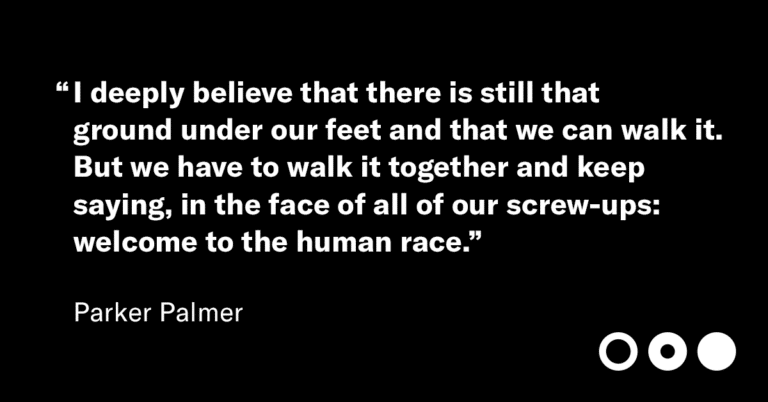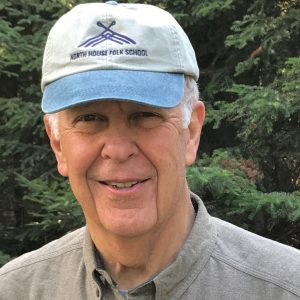Living the Questions
What’s our communal equivalent of rubbing each other’s feet?
A companion conversation to Parker Palmer’s reflections in this week’s On Being, about the soul in depression. Krista catches up with her friend and teacher in 2021. Plus, Parker learns to use QuickTime.

Guest

Parker J. Palmer is a teacher, author, and founder and senior partner emeritus of the Center for Courage & Renewal. His many books include Healing the Heart of Democracy, Let Your Life Speak, and On the Brink of Everything. He's also a contributor to the book, Anchored in the Current: Discovering Howard Thurman as Educator, Activist, Guide, and Prophet.
Transcript
This transcript has been lightly edited for readability.
Krista Tippett, host: So, Parker, I did not overthink this. The Living the Questions is really, truly conversational and not the usual preparation I do. I just want it to be like it is when you and I get on the phone together.
And we’re putting the “Soul in Depression” show out again, also.
Parker Palmer: Yeah.
Tippett: And there’s the story you tell about your depression, which you told me in the show, which you’ve written about, that no one ever forgets. That you were depressed and unable to see beyond. One is so trapped, and it is so dark all around. Words failed, and all the things people said, trying to be helpful, just made it worse. And you tell the story of this one friend who somehow knew to come to you, and he didn’t try to talk, and he didn’t tell you it was gonna be better, but he rubbed your feet. And somehow he had touched the one place in you that still had feeling.
When I think about that image, I just wonder, what is the equivalent of what we can do [laughs] in this culture right now, to find the places that can still feel comfort. What’s our communal equivalent of rubbing each other’s feet?
Palmer: [laughs] Well, I have to say, first of all, that I don’t think anything can take the place of a good foot rub. [laughs]
Tippett: [laughs] Fair.
Palmer: As many people know, as you know, there’s just something about that kind of bodily care from a trusted person, which Bill Taber certainly was, for me, the late Bill Taber. A man I always want to honor for helping to save my life. There’s something about that kind of touch that reconnects you to the human community when you’re in a state where you feel there’s no possible way to reconnect. In that deep darkness, I wasn’t just lost in the dark, I had become the dark. There was not an atom in my body that felt connected to anything. I was just floating in cold outer space. And when Bill came to my house every afternoon to do that, he instinctively found the one place in my body where I could feel the sense of connection. And he kept doing that, faithfully.
So, it’s a great question. William James asked, “What’s the moral equivalent to war?” Well, what’s the moral equivalent to a good foot rub? [laughs]
Tippett: [laughs] So, what do you think?
Palmer: Well, this I learned from Howard Thurman. Howard Thurman has this way of being very, very gentle in his writing. I think it’s one of the reasons that he must be read by more and more white people. That’s one of the reasons that Greg Ellison wanted to put out this book and asked me, and Barbara Brown Taylor, to write for it, along with many other folks.
Thurman had a way of speaking and writing gently. But underneath that gentleness, there’s a fierceness. And there’s fierce love. There is fierce compassion. There is a claim on your life that comes from so deep that it’s hard to name the place in him. And it reaches, sometimes, the same place in those who read him. So there’s a challenge in the midst of the comfort. I don’t have a formula for how you do that, for how you write that or how you speak that or how you be that, but for me the implications are pretty clear. I must cultivate in me the fierceness of truth, which is that there is ground under our feet, we can find a way out, as millions of human beings over millennia have done. But we can’t do it by fighting, and we can’t do it by ourselves. We must do it in community, and we must do it with an eye toward choosing life at every step. And we’re gonna need to forgive ourselves for choosing death along some of those steps — our own death, not the death of other people, but our own death. We do sometimes choose that.
And if that fierceness is in me, and I equally cultivate the compassion — the love that drives me to want to connect to as many people as possible, and frankly if I look for those who are within reach of love and not try to reach those who have in a very determined way put themselves beyond love — then I have work to do in my own life. I have it to do, day by day.
Greg Ellison, my mentor who’s half my age — you know that I have many of those — Greg Ellison says that his grandmother taught him that while he can’t change the whole world, he can change what’s within three feet or so at every moment of his life. On Zoom, it’s like we’re within less than three feet. [laughs] And we can do that at every moment. And he hands people at his workshops a tape measure, a yard tape measure, and he says, “Just carry this with you, and at any given moment stretch it out, either literally or in your imagination. See what you might change for the better with the people you’re with, the situation you’re in, the writing you’re doing, etc., etc. I’ve come increasingly to live by that. Because, Krista, that goes in my journal of small successes, when I can do that a few times a day: “Oh, I hit the three-foot mark, and that’s good.”
Tippett: [laughs] I think that this is also such a great reality check, because one of the most, I would say, morally distracting and demoralizing realities of our life now is, we get so fixated on vivid and constant images of the worst, most violent actors and moments. And forget, and turn away from, dismiss, what’s possible within three feet. Which is to say, in our lives. Which is to say, in reality. And that’s where our power and our agency are at all times.
Palmer: My conservative friends and, even more, the far right friends, will often accuse people like me of being addicted to CNN. Well, I can’t watch CNN. I have never been able to watch CNN for very long, because there’s five stories of cataclysmic global problems on the screen at any one time, some of them scrolling, some of them in small boxes, some of them in big boxes, people raising their voices. They may be raising their voices on sort of “my side” of the political spectrum, though not always. But it drives me nuts. It disempowers me. It’s not just brain chaos, it’s disempowerment, to have the world presented in a way that takes you so far beyond three feet or so that you just walk away thinking, “I think I’ll have a drink. There’s nothing I can do.”
So why do we engage in self-disempowerment? And that’s why I like the David Wagoner poem where he just says, “Stand still. You’re not lost. You may think you’re lost, but this forest knows where you are. And listen for guidance.” Having had that exact, literal experience hiking in the wilderness one time, I think it’s very real advice.
Tippett: Sharon Salzberg told me about a Zoom event you all did at some point mid-pandemic, and what did you do? You asked everybody in the room to say, “Welcome to the human race”? [laughs]
Palmer: I love working with Sharon. She’s this master meditation teacher, and she’s so centered. She’s so real, but she’s so centered. Then I make jokes and I do something snarky. And I finally said, “We’ve got a great good cop/bad cop routine going here,” where Sharon’s the good cop. [indistinct]
So what I did. Sharon and I were talking about the same kind of tangles, the Gordian knots that you and I, Krista, have been exploring this morning. Sort of at the end of that effort to unravel some things and to confess our own sins of lostness and of sometimes impotence or ignorance in the face of all this, I said another thing that I learned in depression. Because it was literally said to me by a therapist after I had revealed some things that I found most devastating about who I had come to know myself to be. After listening carefully to my, as it were, secular confession, he looked at me with real kindness in his eyes, and he said, “Welcome to the human race.” Which was a moment I realized a couple of things: Nothing shocks this guy, because he’s seen it all. So I’m not nearly as special as I thought I was, [laughs] even in my shadow. And this is part of the human condition: to feel ignorant, to feel confused, to feel lost, to feel there is nothing I can do. And as long as we cling to those feelings, we will be ignorant, lost, and have nothing to do. But as soon as we can say, “That just comes with the territory of being human, welcome to the human race,” then we start to get liberated from those paralyzing emotions. And there are things we can do, many things within three feet or so. Or maybe for some of us five feet, ten feet, twenty feet, a mile. Your radius expands as you walk this walk, it seems to me, with the help of other people.
You’ve helped me. Greg has helped me. So many conversation partners have helped me that they’re just endless. Courtney Martin. So many people that I could name. Sharon Salzberg, who’s a new partner for me. Valarie Kaur. Et cetera. So many people have helped me. I just can’t get along without a lot of help from my friends. And that, too — offering ourselves in community with acts such as foot rubs or careful listening — is part of our way forward. I deeply believe that there is still that ground under our feet and that we can walk it. But we have to walk it together and keep saying, in the face of all of our screw-ups: welcome to the human race.
Tippett: That’s it. That’s a wrap. Thank you. I love talking to you. Everybody’s gonna love hearing from you.
Palmer: Oh, [laughs] thanks. It was always great to talk to you. And your great staff, I really appreciate, too, Julie and Zack and all the good folks that helped set this up. Zack taught me how to operate QuickTime, so that’s a huge contribution to my life. I will be making videos, to look at myself, for days to come.
Tippett: [laughs] All right. You take care until we speak again. I love you.
Palmer: I love you, too. Be well, everybody.
